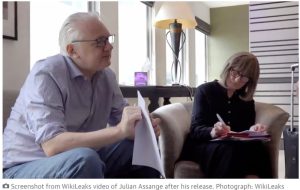Syria: what can be done?
Five commentators discuss the merits of five ways in which the outside world could respond to Syria’s crisis
Abdel Bari Atwan, Michael Weiss, Seumas Milne, Shashank Joshi and Mehdi Hasan
guardian.co.uk, Friday 10 February 2012 10.30 GMT
1. Full-scale military intervention?
Abdel Bari Atwan I am opposed to military intervention by the west. Syria is not Libya, the army is well-armed and equipped with sophisticated weaponry. We would witness catastrophic civilian casualties. We have already seen the disasters caused by such intervention in Iraq and Afghanistan. In addition, the dangers of an internationalisation of the conflict are too great, with Russia, Iran and possibly China standing with Syria and Hezbollah against Nato and Israel. Such action would need a UN resolution which is clearly not forthcoming given Russia and China vetoed the last attempt to condemn Assad.
Michael Weiss A "full-scale intervention" needs to be properly defined first. Does that mean a US ground assault into Damascus? Occupation? Frankly, I don’t know anyone in the pro-intervention camp who advocates such a plan. However, we should be clear about the aim of any use of force in Syria at this stage: this will only end with the removal of Bashar al-Assad from power, as that is now the stated policy of western governments, Turkey and the Arab League.
Seumas Milne A direct invasion of Syria to topple the regime would be another disaster on the Iraq or Afghanistan model, lead to a catastrophic loss of life, trigger a long-running guerrilla war, draw in armed groups from neighbouring states and Iran against another western military occupation of an Arab, Muslim state. Fortunately, there is currently no significant support for such a course.
Syria: what can be done?
Five commentators discuss the merits of five ways in which the outside world could respond to Syria’s crisis
Abdel Bari Atwan, Michael Weiss, Seumas Milne, Shashank Joshi and Mehdi Hasan
guardian.co.uk, Friday 10 February 2012 10.30 GMT
1. Full-scale military intervention?
Abdel Bari Atwan I am opposed to military intervention by the west. Syria is not Libya, the army is well-armed and equipped with sophisticated weaponry. We would witness catastrophic civilian casualties. We have already seen the disasters caused by such intervention in Iraq and Afghanistan. In addition, the dangers of an internationalisation of the conflict are too great, with Russia, Iran and possibly China standing with Syria and Hezbollah against Nato and Israel. Such action would need a UN resolution which is clearly not forthcoming given Russia and China vetoed the last attempt to condemn Assad.
Michael Weiss A "full-scale intervention" needs to be properly defined first. Does that mean a US ground assault into Damascus? Occupation? Frankly, I don’t know anyone in the pro-intervention camp who advocates such a plan. However, we should be clear about the aim of any use of force in Syria at this stage: this will only end with the removal of Bashar al-Assad from power, as that is now the stated policy of western governments, Turkey and the Arab League.
Seumas Milne A direct invasion of Syria to topple the regime would be another disaster on the Iraq or Afghanistan model, lead to a catastrophic loss of life, trigger a long-running guerrilla war, draw in armed groups from neighbouring states and Iran against another western military occupation of an Arab, Muslim state. Fortunately, there is currently no significant support for such a course.
Shashank Joshi Full-fledged military intervention in Syria would have neither legal sanction nor Russian or Chinese approval, and would therefore shred our co-operation with those countries on issues of national concern – from the Iranian nuclear programme to withdrawal from Afghanistan. Syria’s opposition is far weaker than Libya’s, faces a military eight times larger than Gaddafi’s, has no Benghazi equivalent as a safe haven and remains nationally unco-ordinated. Iran would relish the opportunity to bog down western forces. We would face years of inconclusive urban warfare against a stiff loyalist resistance that enjoyed safe havens in Lebanon and, somewhat ironically, Iraq.
Mehdi Hasan I want Bashar al-Assad out – as all democrats and internationalists should. But a full-scale, foreign military intervention isn’t the way – and could prove to be a moral and political catastrophe. Dropping bombs from 5,000ft would guarantee further civilian casualties and rally some anti-Assad Syrians behind the regime. Military action might salve our consciences but it won’t stop the violence and it isn’t what most Syrians want. It would also – like Iraq, but unlike Libya – be illegal and lack legitimacy.
2. Safe zones and humanitarian corridor?
Abdel Bari Atwan These would need to be policed either by air or troops on the ground. Syria would interpret this as a declaration of war and would certainly attack. Assad would not want to provide shelter for defectors and opposition leaders either. Again, this risks escalation.
Michael Weiss I’d advocate the creation of a safe zone in Syria, backed by appropriate air cover, because it would create not only a humanitarian refuge for Syrian civilians, but also a much-needed base of operations for the atomised opposition. What the rebels need, and what the US, Europe and Turkey can provide, is their own Benghazi, to close ranks and map a viable strategy. Otherwise they will be no match for a regime equipped with tanks and fighter jets, backed by the IRGC (Iran’s Revolutionary Guards) and Hezbollah mercenaries, and Russian materiel. The Syrian army is down to about 300,000 troops, three-quarters of which never leave the barracks for fear of their defection. If those deployed realise they’re now up against western aircraft and Turkish soldiers, many will likely abandon the fight altogether or join the other side – which is not to say, of course, that Assad will not still command a loyalist hardcore.
Seumas Milne This is effectively the Libyan option, which would entail heavy Nato air bombardment of Syrian forces and defences and deployment of special forces, but without a UN fig leaf. It would mean direct involvement of the western military in another Arab civil war in a much more toxic sectarian and regional context, dramatically increase the death toll and risk morphing into full-scale intervention.
Shashank Joshi Syria’s opposition already has a safe zone of sorts, in southern Turkey. It is misleading to project a safe zone on Syrian soil as "intervention lite". A no-fly zone by itself would do little, given that Damascus is not deploying air power, and would anyway require a preparatory bombing campaign against Syria’s extensive air defences. A safe zone would either have to escalate into a full-scale intervention in densely populated areas, or risk becoming not very safe at all. Finally, Turkey – best placed militarily and diplomatically to undertake any such an effort – has shrunk from taking the lead.
Mehdi Hasan Syria isn’t Libya. The latter is a nation of 6.5 million people, while the former consists of more than 20 million. Unlike Libya, Syria’s densely populated cities and towns are a mix of ethnic and religious communities: the country cannot be spliced into pro-rebel east and pro-dictator west. To carve out a safe zone or corridor – where? With whose authority? For how long? – would, in the words of the US Middle East analyst Marc Lynch, "be concrete, visible evidence of the foreign conspiracy to divide Syria about which Assad already speaks". It would also, inevitably, lead to escalation and, eventually, full-scale war with all of the aforementioned challenges and objections.
3. Train and equip the Free Syrian Army?
Abdel Bari Atwan This would take time and a host country for training camps would have to be found. No country has volunteered, almost certainly because they fear Syrian reprisals. In addition there are two opposition armies, the FSA and the Revolutionary Army. The opposing forces then, are fragmented and weak.
Michael Weiss I agree with this option in principle – as the Saudis and Qataris seem to already do in practice – but a safe zone must be established as a matter of priority. The military wing of the anti-Assad campaign is not monopolised by the Free Syrian Army; it is a loosely affiliated consortium of independent brigades and militias consisting of both army defectors and civilians, armed with Kalashnikovs and hunting rifles. Needless to say, these brigades’ partnerships with the controversial Syrian National Council (SNC) are either nominal or non-existent. The rebels need training and professional logistical support along with sophisticated weapons lest the entire campaign descend into a state of regional warlordism or worse: what might be called a civil war within a civil war.
Seumas Milne: Gulf autocracies such as Saudi Arabia and Qatar have already begun to do this and there are also reports of covert western support. But funnelling weapons to the armed wing of a fractured opposition will only escalate the conflict and killing without any prospect of tipping the military balance against the Syrian army, leading to pressure for more far-reaching intervention.
Shashank Joshi: Syria’s civil war is already internationalised, with Damascus receiving Russian arms and Iranian advisers. Should the playing field not be levelled? In part, this is out of our hands: Qatar and Saudi Arabia, in concert with Syria, will bolster their own favoured insurgents. But the FSA has no real control over the various local militias active within Syria, and it’d be dangerous to funnel in arms to a fractured and dispersed insurgency – how many would end up in fragile Iraq? Non-lethal equipment, particularly for communications and self-defence, is preferable. A precondition of training must be accountability to a political body.
Mehdi Hasan Let’s be clear: blindly backing the Free Syrian Army (FSA) won’t lead to the toppling of the Assad regime – the FSA claims to have 15,000 fighters, a tiny figure compared to the regular army’s 200,000 well-armed troops. The FSA – mocked by some opposition activists as the "Facebook Syrian Army", because of its heavy online, rather than real-world, presence – consists of defectors from Assad’s security forces. How do we know what they will do with the guns and bombs we give them? In Libya, human rights groups have extensively documented the murders, beatings, looting and torture carried out by our friends, the anti-Gaddafi rebels, whom we trained and equipped.
4. A ‘Friends of Syrian people’ package?
Abdel Bari Atwan This succeeded in Libya, where the regime was widely reviled and there was the added incentive of oil. Assad still has a lot of supporters – the Alawites and the Syrian Shia back him. In the long run this option would probably end in military intervention and lead to full-scale war.
Michael Weiss On this point, a contact group or "Friends of Syria" initiative designed to shore up international support for the rebels should proceed apace with the creation of a Friends in Syria programme to unify the opposition, as discussed above. The Pentagon and state department need to inherit the supervisory role that has been played by Turkey for the last eight months.
Seumas Milne The US, Britain and others are now backing this option, which will mean opposition groups coming under greater supervision by the west, undermining their national credibility and feeding the sense of western involvement in the crisis as part of a proxy war with Iran. War crimes indictments would only make regime leaders less likely to agree to a political transition.
Shashank Joshi Russia and China vetoed our best chance for a peaceful settlement to the conflict, based on the Arab League’s plan to have Assad hand power to his vice president. That plan should remain the focal point of any international contact group. Both regime and rebels ought to be pressured and incentivised to accept its provisions – mutual ceasefire and Syrian-led transition. That will only work if intense multilateral pressure is placed on the Syrian regime. But no less important is that we coerce weaker and more pliable Syrian allies, in particular its neighbours Lebanon and Iraq, to fall in line.
Mehdi Hasan "Friends of Syria" should indeed push for multilateral and targeted sanctions and consider threatening Assad and his cronies with international criminal court indictments unless they stop the violence – but how is this possible without Russia and China’s support? Only the UN security council, for example, can refer the Syrian regime to the ICC. Then there is the Syrian National Council (SNC), which has been referred to derisively as a "council of exiles" by its Syrian critics. How much credibility and legitimacy does the SNC have? And why should we give political support to the pro-intervention SNC, rather than, say, the anti-Assad National Co-ordination Committee (NCC), which is implacably opposed to foreign intervention?
5. Mediated talks between Damascus and the opposition?
Abdel Bari Atwan This is my preferred option. The other Arab states could help by allowing the opposition forces outside Syria to properly organise themselves for dialogue, and then establish a common front with the opposition. A face-saving departure package would need to be put in place for Assad – as it was for Yemen’s Ali Abdullah Saleh – and every effort made to persuade him to leave at the end of his term (2014), making way for proper and lasting reform. Who should broker talks? I think this would be a role for the UN with all their expertise and experience.
Michael Weiss Because of the unremitting and sadistic nature of the regime’s repression, any discussion of a negotiated settlement that leaves Assad in power is worse than a waste of time; it’s an insult to the Syrian people. He has wrecked this country in spectacular fashion, forfeited his "sovereignty" in the eyes of most nations, and now sets about a scorched-earth policy that targets children as young as a few months old. Humankind cannot bear very much reality, said TS Eliot. Syrians cannot bear to reconcile with a mass murderer.
Seumas Milne With neither side able to prevail, pressure for a negotiated Syrian political solution – based on a halt to violence and a process leading to elections – is the only option likely to reduce the bloodshed. But for such negotiations to stand a chance of success, they would need to be backed by the main regional and international players, including Turkey, Iran, Russia and the west.
Shashank Joshi Placing aside the legitimacy of Russian and Chinese support for Syria’s genocidal actions, it is a political reality that these and other states have important interests in the survival of the Syrian regime. Russia may be open to a political transition as long as Russia is closely involved, to save face in election year, and if the settlement that emerges protects some of its interests. Ultimately, however, no talks will have credibility with the armed opposition unless they culminate in government forces pulling back; if that doesn’t happen, the civil war will continue to escalate.
Mehdi Hasan The best – only? – viable option for this crisis is to push, in accordance with article 7 of the vetoed UN resolution, for regionally mediated talks between the regime in Damascus and "the whole spectrum of the Syrian opposition" – the SNC, the FSA and the NCC. Arab League countries – ideally Egypt or Tunisia, rather than pro-intervention Gulf autocracies – would take the lead, sending in human-rights monitors and, if necessary, peacekeepers (or "green helmets"). As the NCC’s Haytham al-Manna has pointed out: "There are precedents for Arab intervention without casualties, whereas there is not a single example in the history of, say, Nato intervention without victims." Would negotiations halt the killings overnight? No – but neither would an attack from the air.






